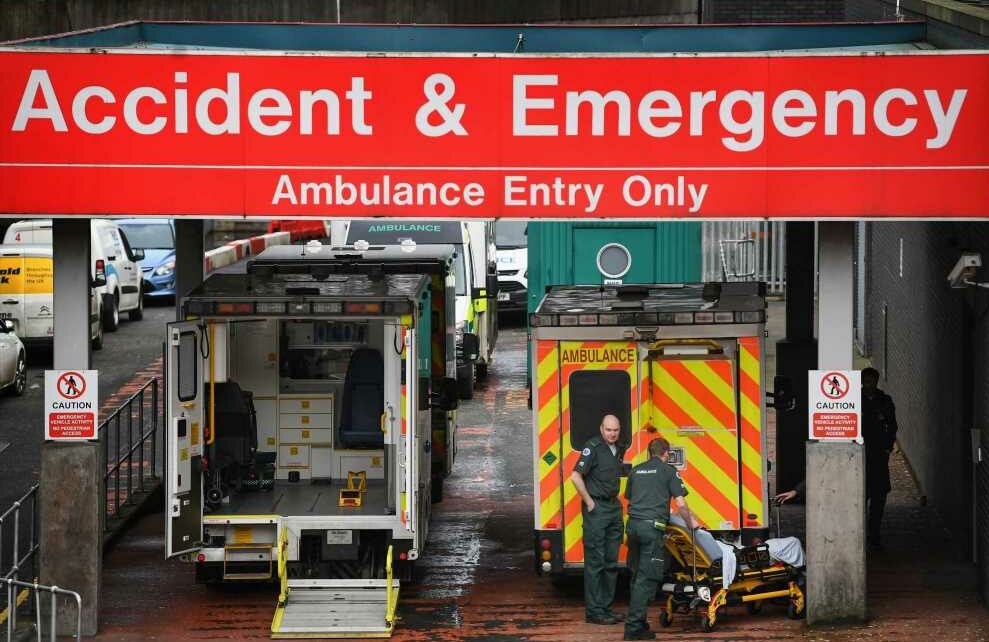HOSPITALS are seeing three times as many patients with the winter vomiting bug norovirus as they did this time last year, data shows.
NHS bosses say facilities could be set to face a tougher Christmas this year than last.

Overall, there are more than 1,200 more patients in hospitals than in the same week in 2022, with experts warning flu and RSV in children will also continue to pile on pressure.
Professor Sir Stephen Powis, of the NHS, said: “We all know somebody who has had some kind of nasty winter virus in the last few weeks.
“Today’s data shows a much higher volume of norovirus cases compared to last year and the continued impact of infections like flu and RSV in children on hospital capacity — all likely to be exacerbated by this week’s cold weather
“It is clear that even before we enter December the demand on hospitals and staff is high and we know that is likely to grow considerably before Christmas.”
Read more on the NHS
 RASH DECISION
RASH DECISION
Doctors to check pregnant women for medieval STI in change to NHS guidelines
 BREAKTHROUGH
BREAKTHROUGH
NHS consultants reach six-figure pay deal that could finally end strikes
An average of 90,144 patients were in general and acute beds every day last week, compared to 88,902 at the end of November in 2022.
Some 351 had diarrhoea and vomiting symptoms — signs of norovirus — up from 126 in the same week the year before.
Norovirus spreads easily through contact with someone who has the virus or with contaminated surfaces.
While most people make a full recovery within two or three days, the virus can lead to dehydration, especially among the very young, the elderly or those with weakened immune systems.
Most read in Health
 UP IN SMOKE
UP IN SMOKE
Leading vape brand ditches its most popular flavours
 VIRAL SPREAD
VIRAL SPREAD
European cities ‘most likely to be hit hardest’ by China’s ‘pneumonia’
 BULLY HELL
BULLY HELL
Trolls think we’re aliens after mystery illness left us with E.T-shaped faces
 DYING TO BE THIN
DYING TO BE THIN
Mum fighting for life in front of kids after self-injecting ‘skinny jab’
The NHS data also show 153 patients had flu and 131 children were in hospital with RSV, a common virus that can cause bronchiolitis in babies and children under two.
Miriam Deakin, of NHS Providers, said: "Demand for and pressure on the NHS continue to bite.
"Last winter was the worst that many in the NHS can remember and this time could be even tougher.
"As temperatures plummet, pressure on the NHS hots up with winter illnesses and bugs like flu adding to already high demand on services and staff."
Professor Nicola Ranger, of the Royal College of Nursing, said: “This winter will be just as challenging as last year.
“Nursing staff are doing all they can to hold together the NHS whilst it is under immense strain.
"The current stress on our health and social care system has left nursing staff caring for far too many patients on every shift."
The data also shows that a quarter of patients arriving by ambulance at hospitals last week waited at least 30 minutes to be handed over to A&E teams.
Some 22,588 delays of half an hour or longer were recorded across all hospital trusts in the week to November 26.
This was 25 per cent of the 89,506 arrivals by ambulance, where the handover time was known.
However it is lower than the 31 per cent figure for the equivalent week last year.
Some nine per cent of handovers last week, or 8,239 patients, were delayed by more than an hour, compared with 15 per cent in this week in 2022.
Read More on The Sun
 SET UP?
SET UP?
I'm A Celeb fans claim ITV 'separated Nella and Nigel' after racism row
 ALL CHANGE
ALL CHANGE
DWP's warning to 'act quickly' over Universal Credit change or lose benefits
Sir Stephen said: “There has been a significant reduction in ambulance handover delays despite higher demand.
“The public can also play their part by using services in the usual way and by getting their Covid and flu jabs if eligible.”
What are the signs of norovirus?
The main symptoms of norovirus are:
- feeling sick (nausea)
- diarrhoea
- being sick (often projectile vomiting)
You may also have:
- a high temperature
- a headache
- aching arms and legs
The symptoms start suddenly within one to two days of being infected.
Source: The NHS
Source: Read Full Article


